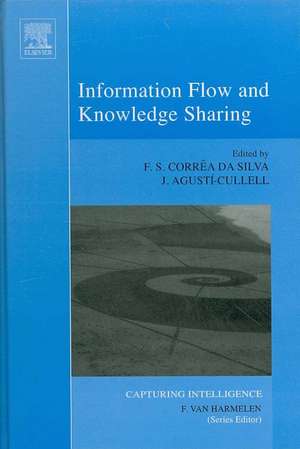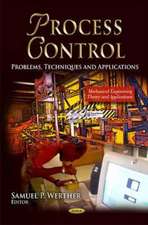Information Flow and Knowledge Sharing: Capturing Intelligence, cartea 2
Autor Flavio Soares Correa da Silva, Jaume Agusti-Cullell Editat de Mary E. James Frank van Harmelenen Limba Engleză Hardback – 30 apr 2008
- Bridges the gap between the technological and philosophical aspects of information technology
- Analyzes essential notions of IT such as information, knowledge, information system, information flow, collaborative problem solving, and ontological reasoning
Preț: 883.28 lei
Preț vechi: 1104.10 lei
-20% Nou
Puncte Express: 1325
Preț estimativ în valută:
169.03€ • 183.55$ • 141.99£
169.03€ • 183.55$ • 141.99£
Carte tipărită la comandă
Livrare economică 22 aprilie-06 mai
Preluare comenzi: 021 569.72.76
Specificații
ISBN-13: 9780444529350
ISBN-10: 0444529357
Pagini: 296
Ilustrații: Illustrated
Dimensiuni: 165 x 240 x 25 mm
Greutate: 0.69 kg
Editura: ELSEVIER SCIENCE
Seria Capturing Intelligence
ISBN-10: 0444529357
Pagini: 296
Ilustrații: Illustrated
Dimensiuni: 165 x 240 x 25 mm
Greutate: 0.69 kg
Editura: ELSEVIER SCIENCE
Seria Capturing Intelligence
Public țintă
IT industry professionals; scholars, researchers and students in IT, artificial intelligence, philosophy of science and philosophy of technologyCuprins
1 IntroductionIntended audience Chapters’ contents Intermission 2 Information Agents and the world Reality and structure Information systems A non-rationalistic stance Bibliographical notes Intermission 3 Information Flow Communicated information Noise and distortion Received information Communication systems The purpose of communication Bibliographical notes Intermission 4 Shared Understanding Dialogues for shared understanding Communication spaces Productive dialogue Facilitators for productive dialogues Bibliographical notes Intermission 5 Collaborative Problem Solving Coordinated action Reliability and trust Bibliographical notes Intermission 6 Ontological Reasoning Ontology Patterns of interaction Bibliographical notes Intermission 7 Uncertainty Controlled uncertainty Trust, confidentiality and privacy Bibliographical notes Intermission 8 Knowledge Sharing The illusion of life Bibliographical notes Intermission 9 Knowledge Bibliographical notes 10 Conclusion Epilogue










